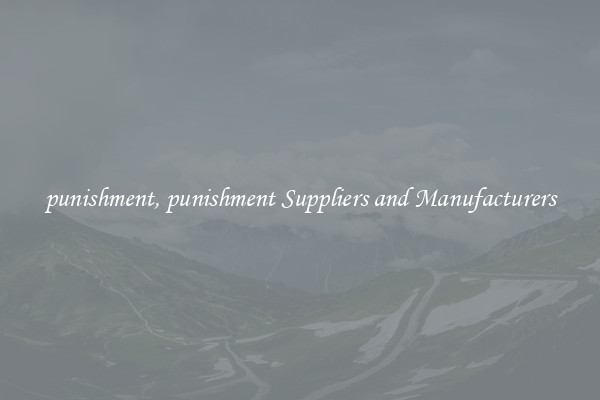punishment, punishment Suppliers and Manufacturers
Punishment is an integral part of any society's justice system. It serves as a deterrent for potential wrongdoers and provides a sense of justice for victims. Punishment can take various forms, including imprisonment, fines, community service, and even capital punishment. However, behind every punishment lies a network of punishment suppliers and manufacturers that ensure that justice is served efficiently.

Punishment suppliers are responsible for providing the necessary equipment and materials needed for various forms of punishment. For instance, in the case of imprisonment, suppliers provide correctional facilities with essential items such as uniforms, bedding, furniture, and security systems. These suppliers ensure that prisoners are kept in a secure and controlled environment while serving their sentences.
Similarly, punishment manufacturers play a critical role in the justice system. They produce a wide range of goods, including handcuffs, batons, tasers, and other security-related equipment required by law enforcement agencies. These manufacturers must adhere to strict quality standards to ensure that the items they produce are reliable and effective in maintaining public safety.
One of the key considerations in the selection of punishment suppliers and manufacturers is the emphasis on human rights. Organizations and governments need to ensure that the products they acquire are ethically produced and do not violate any human rights standards. For instance, there have been cases where the use of particular equipment, such as faulty tasers, has resulted in excessive force and even fatalities. Therefore, it is crucial for authorities to partner with suppliers and manufacturers who prioritize accountability and respect for human rights.
Another significant aspect of punishment supplies and manufacturing is cost-effectiveness. Governments must obtain these products and services at a reasonable price to ensure efficient allocation of resources. Moreover, manufacturers need to constantly innovate and improve their products to meet the evolving needs of the justice system. For instance, advancements in surveillance technology have led to the development of modern security systems, making it easier for correctional facilities to monitor prisoners and prevent escapes.
However, the question of whether punishment is the most effective way to rehabilitate offenders has been a subject of debate. Some argue that punishment alone does little to address the root causes of criminal behavior. They advocate for a more holistic approach, including rehabilitation programs and education, to reduce recidivism rates and promote social reintegration.
In conclusion, punishment suppliers and manufacturers are essential components of any justice system. Their products and services provide the tools needed to ensure that punishment is carried out in a fair and efficient manner. However, the effectiveness of punishment in preventing crime and rehabilitating offenders is a complex issue that requires a broader societal discussion. Ultimately, striking a balance between punishment and reform can lead to a more just and safer society.

View details

View details

View details

View details








